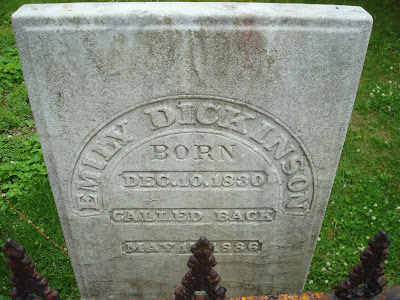 |
| Photo: June 2010; Amherst, Massachusetts |
Because I could not stop for Death,
He kindly stopped for me;
The carriage held but just ourselves
And Immortality.
We slowly drove, he knew no haste,
And I had put away
My labor, and my leisure too,
For his civility.
We passed the school, where children strove
At recess, in the ring;
We passed the fields of gazing grain,
We passed the setting sun.
Or rather, he passed us;
The dews grew quivering and chill,
For only gossamer my gown,
My tippet only tulle.
We paused before a house that seemed
A swelling of the ground;
The roof was scarcely visible,
The cornice but a mound.
Since then 'tis centuries, and yet each
Feels shorter than the day
I first surmised the horses' heads
Were toward eternity.
I love to say this poem aloud, and when I do I pronounce 'civility' civili-tay. And I must say too that I'm a little embarrassed that I prefer a version tinkered up by a couple of editors after the poet's death ... and in which version the third stanza reads:
We passed the school where children played,
Their lessons scarcely done;
We passed the fields of gazing grain,
We passed the setting sun.
But totally leaves out what is Emily's lovely next stanza in the original:
Or rather, he passed us;
The dews grew quivering and chill,
For only gossamer my gown,
My tippet only tulle.
(The paperback of Dickinson poems I bought in 1969 in Germany contains the tinkered version of this poem, and I never ran across or noticed the original version until a couple years back; I was sent by this newly discovered stanza to my dictionary: "tippet - a long hanging end of cloth attached to a sleeve, cap, or hood.")
-------
P.S. It seems somehow disloyal, too, to prefer one of the edited poems since it was probably edited by a woman named Mabel Todd Loomis -- a free-spirited woman who had a long affair with Emily's married brother, Austin, causing, along with the surprisingly adulterous Austin, much disapproval and smashed spirits within the Dickinson family; Emily was particularly fond of her beloved brother and particularly unfond of Mabel Todd Loomis .
No comments:
Post a Comment